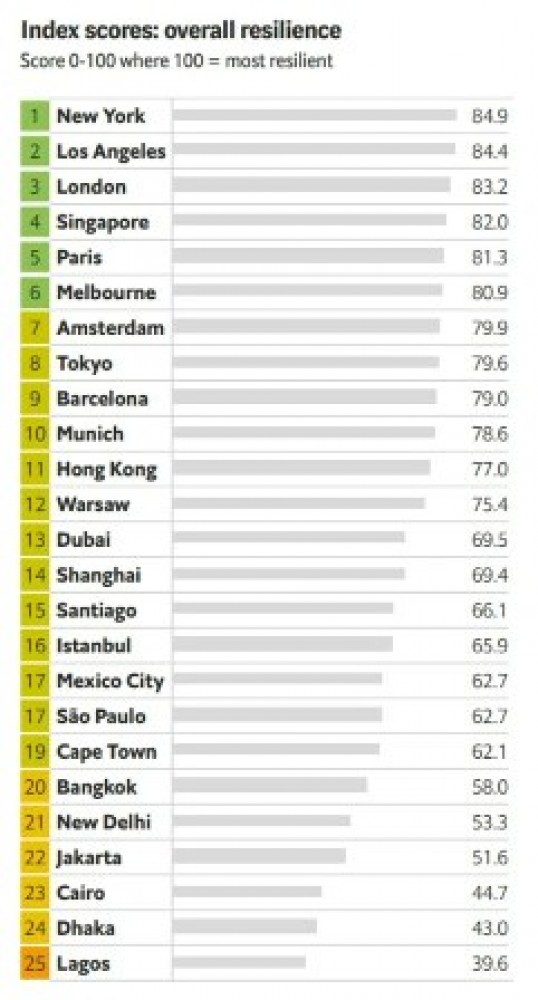Environmental resilience a critical concern for major Asian cities
Nata Kesuma
Rabu, 06 Desember 2023 - 09:17 WIB

Thepresidentpost.id - Singapore, Tokio Marine Group and Economist Impact announced the launch of The Resilient Cities Index 2023, a major new study into the most prominent risks faced by global cities. The index was devised by Economist Impact and sponsored by Tokio Marine Group, delving into 25 global cities' ability to evade, withstand, and recover from a spectrum of shocks and long-term stresses.
By 2050, over two-thirds of the global population will reside in cities. Rapid urbanisation is making this threat more urgent than ever as cities are facing evolving threats to the urban centres. The purpose of this research is to help measure the resilience of societies and cities, identify the gaps and challenges, and give insights into the opportunities and the way forward.
The Index finds that cities in the Asia and Pacific region are more vulnerable to climate change due to their geography and particular exposure to natural catastrophes and increasingly extreme weather events. In developing countries, this is often compounded by weak institutional infrastructure, and a considerable portion of the population having lower incomes. Asian cities perform comparatively well in disaster management, with Hong Kong, New Delhi, Shanghai, Singapore and Tokyo scoring high for culture of readiness. The report finds that a culture of preparedness is critical to success in disaster resilience.
Some Asian cities also performed well in the critical infrastructure pillar of the index, but there are some weak points that require strategic focus. The cities with the highest scores were Dubai, Shanghai and Singapore. These capital-rich market locations have greater opportunities to develop new infrastructure, compared with European cities constrained by decades- or centuries-old systems. Within this pillar, digital infrastructure and transportation were a drag on cities' resilience.
However, Asian cities lack resilience in other aspects within the Index's environmental pillar, which also ranks resilience related to flooding, heat stress, air pollution and decarbonisation. Among emerging Asian cities, Bangkok, Dhaka and Jakarta are poorly equipped to respond to flooding, while New Delhi and Jakarta are particularly exposed to heat risk, reflecting the challenge these cities face amid increasingly volatile weather that is driven by climate change.
Max Hirai, CEO, Tokio Marine Asia said: "The findings of the Resilient Cities Index demonstrate the need for Asia to take environmental changes more seriously if it is to mitigate existing and emerging risks facing its most global cities and their inhabitants. Extreme weather events, from typhoons and wildfires to flooding and heatwaves, are becoming more frequent and their effects more devastating. Aware that disaster mitigation is a critical social issue, Tokio Marine Group has been working towards creating a comprehensive disaster prevention and mitigation activities.
We have seen, firsthand, the vital role which insurance can play in driving market maturation in emerging economies and how, by increasing insurance penetration and providing social safety net, we can support businesses and communities back on their feet, furnished with the means and expertise to rise stronger."
Pavlos Spyropoulos, Regional Managing Director - Asia Pacific, Tokio Marine Kiln, added: "Responding to the increased vulnerability to natural catastrophes that cities in Asia are facing will require the public and private sectors to collaborate on building resilience.
Specialist insurers have the skills and expertise to help quantify and provide solutions to mitigate against complex risks. This includes, for example, supporting the development of digital infrastructure by providing cyber insurance, and creating new products to protect and build more resilient supply chains."
The establishment of Tokio Marine Resilience will promote comprehensive disaster prevention and mitigation solutions through planning, developing and providing new services. Through this business, Tokio Marine Group will contribute to building a society that is resilient against natural disasters.
Baca Juga
- Minister of Industry Agus Denies Rumors that iPhone 16 Can be Bought on Pre-order
- Indonesia Delivers 2.7 Million Doses of bOPV Polio Vaccine as Humanitarian Aid to Myanmar
- Teaching Hospital will be Present in Jababeka City to Strengthen the Jababeka Medical City Ecosystem
- Govt offers incentives for investors to build EV factories: Industry Minister
- 131,600 Households Enjoy Easy Access to Free Electrical Installation in 2023
Berita Lainnya
National 24/12/2024 10:25 WIB
9 Reasons to Invest in Kota Jababeka with Profit Potential
Investment in Jababeka Industrial Estate in Cikarang, Bekasi or what is now known as the Independent and Integrated City has various potential benefits that can be an attraction for investors. Yes, PT…
Business 24/12/2024 10:12 WIB
PT VOK Electrical Appliance Indonesia Officially Builds Factory in Kendal Special Economic Zone (KEK)
PT VOK Electrical Appliances Indonesia officially held a groundbreaking ceremony for its new factory in Kendal Special Economic Zone (KEK), Central Java. The deputy government of Kendal Regency, Head…
Economy 24/12/2024 08:15 WIB
PT Matahari Tire Indonesia, China's No. 1 Tire Manufacturing Company Officially Operates in Kendal SEZ
PT Matahari Tire Indonesia, a subsidiary of Zhongce Rubber Group Co Ltd (ZC Rubber) from China has officially started the operation of its new factory in Kendal Special Economic Zone, Central Java. The…
Business 23/12/2024 15:19 WIB
Minister of Trade at the Launch of EPIC Sale
Minister of Trade, Budi Santoso together with Coordinating Minister for Economic Affairs, Airlangga Hartarto and Head of the National Food Agency (Bapanas), Arief Prasetyo Adi launched Every Purchase…
Travel 23/12/2024 15:12 WIB
Launch of Shopping in Indonesia Only (BINA) Discount Program 2024
Coordinating Minister for Economic Affairs, Airlangga Hartarto together with Deputy Minister of Trade, Dyah Roro Esti; Deputy Minister of SMEs, Helvi Moraza; Deputy Minister of Tourism, Ni Luh Puspa;…




Komentar